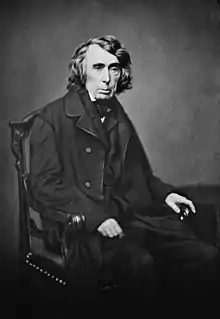Backus v. Gould
Backus v. Gould, 48 U.S. 798 (1849), was a United States Supreme Court case in which the Court held the Copyright Act of 1831 requires the courts award damages from copyright infringement based on the number of copies found in the accused's possession, not the number of infringing copies that they ever printed.[1] At the time, at least in the case of books, a "copy" was defined as a complete reprinting or transcription of the work.[2]
| Backus v. Gould | |
|---|---|
 | |
| Decided March 18, 1849 | |
| Full case name | Backus v. Gould |
| Citations | 48 U.S. 798 (more) |
| Holding | |
| The Copyright Act of 1831 requires the courts award damages from copyright infringement based on the number of copies found in the accused's possession, not the number of infringing copies that they ever printed. | |
| Court membership | |
| |
| Case opinion | |
| Majority | McLean |
References
External links
- Text of Backus v. Gould, 48 U.S. (7 How.) 798 (1849) is available from: CourtListener Justia Library of Congress
This article is issued from Wikipedia. The text is licensed under Creative Commons - Attribution - Sharealike. Additional terms may apply for the media files.
